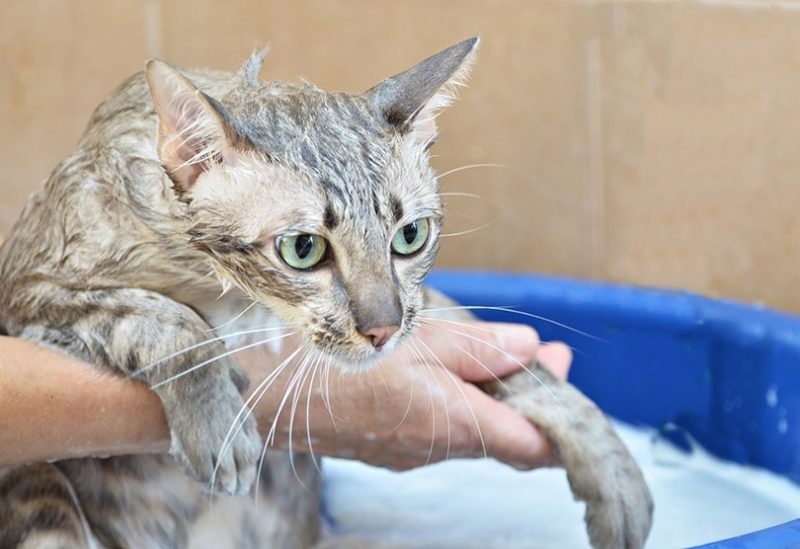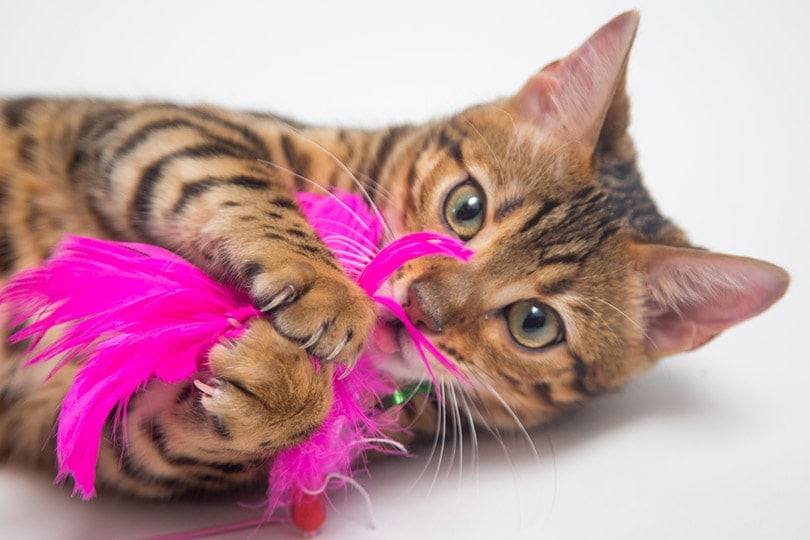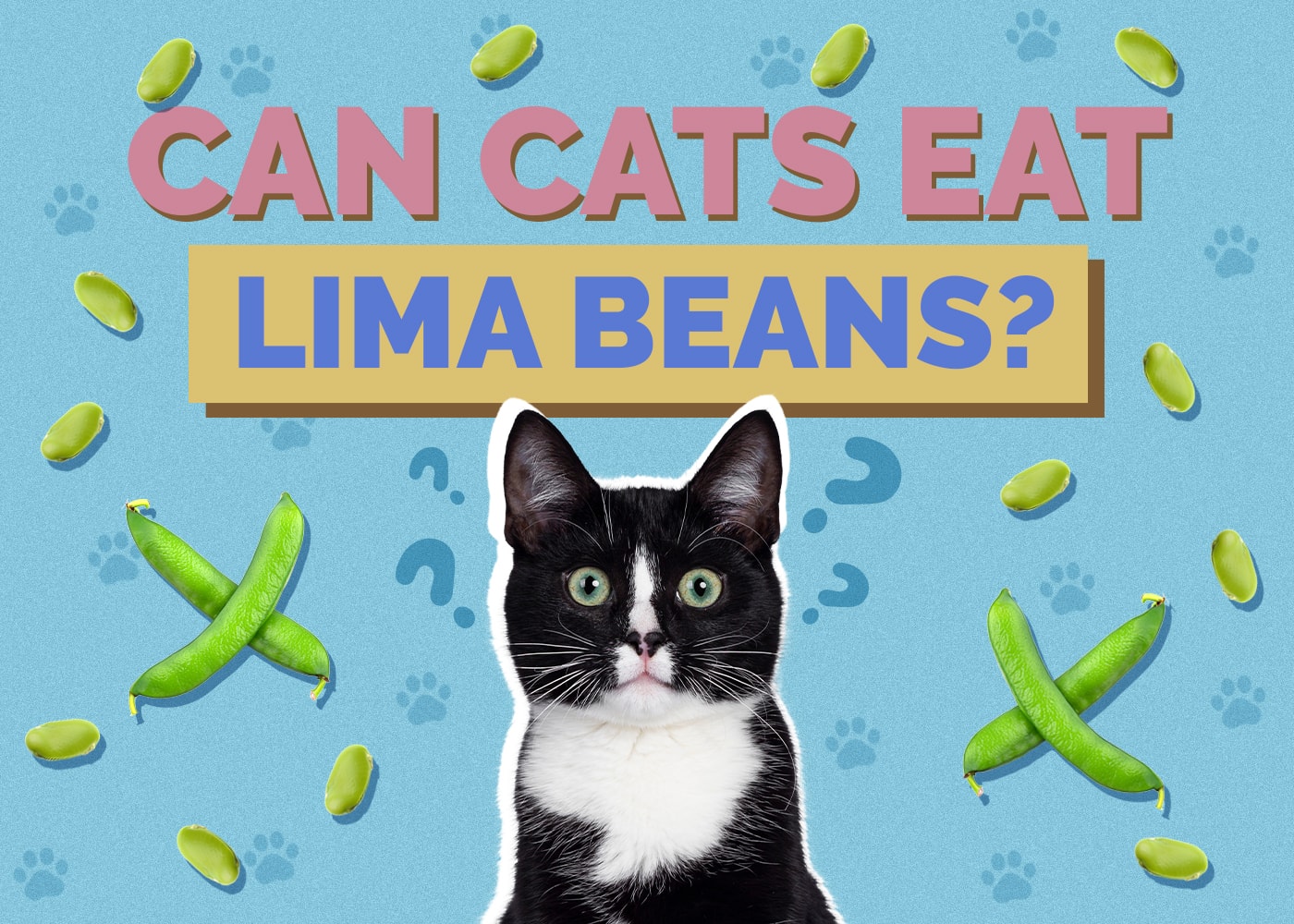Do Maine Coon Cats Shed? Breed Fur Facts & Care Tips

Updated on
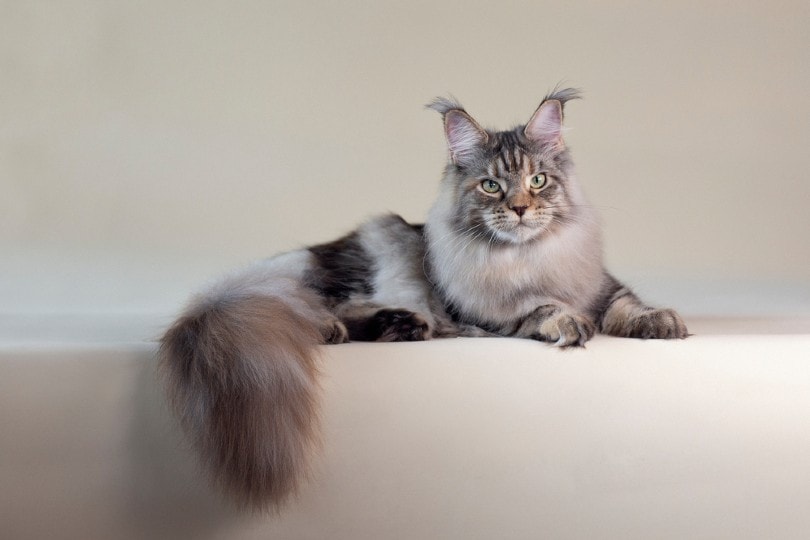
Click to Skip Ahead
Maine Coon cats are one of the most popular cat breeds due to their friendly personalities, giant size, and beauty. Their long, luxurious coats and fluffy “mane” may be gorgeous to look at, but all that hair has to go somewhere, right? We all know that shedding is an unavoidable part of owning most pets. Unless you are lucky enough to love a breed that’s considered low-shedding or hypoallergenic, you have to be prepared for the reality that pets come with a lot of love, and often, just as much hair!
If you’ve fallen in love with the Maine Coon breed, you might be wondering if Maine Coon cats shed and if so, how much? Maine Coon cats do shed and because of this, are not considered hypoallergenic. However, not every Maine Coon sheds the same amount of hair. Despite their long hair, Maine Coons usually don’t shed any more than the average short-haired cat. Read on to learn more about Maine Coon cats’ shedding habits and ways you can manage the hair and still enjoy life with your gentle giant cat!
Why Do Maine Coon Cats Have So Much Hair?
As you might guess from their name, the Maine Coon cat originated in the state of Maine, where winters are long and harsh. The Maine Coon’s long, thick coat developed to help them stay warm in those chilly winters. Maine Coon cats also grow extra fur on their paws, which was originally meant to keep their feet warm and help them walk in the snow.
Maine Coon cats have a double undercoat as well as the outer layer of hair. Their fur grows extra thick around their neck, often making it look like the Maine Coon has a lion’s mane. All that insulation served a practical purpose for the early Maine Coon cats as they lived through the cold winters of their home state. Today, the beautiful coat is one of the reasons the Maine Coon is such a popular pet.
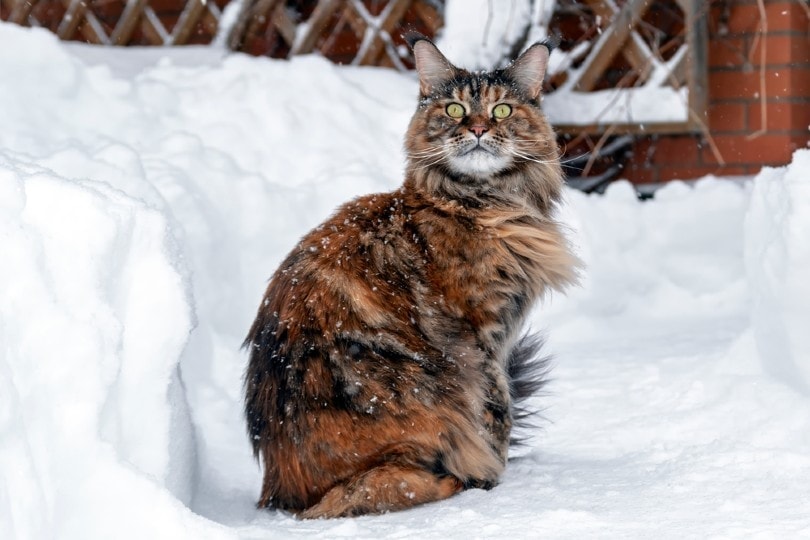
Shedding and Maine Coons: The Basics
Like all cats, Maine Coons shed to get rid of the dead hair produced during the hair growth cycle. How much and how often your Maine Coon cat sheds will depend on several factors, including their individual genetics. Some Maine Coon cats just naturally shed less than others.
Maine Coon cats may shed all year-round or only shed seasonally. If you live in a warmer climate, your Maine Coon cat may not grow as thick of a coat but is more likely to shed year-round. Maine Coons with fluffier hair usually shed more than those with more of a silky texture.
Besides their environment, diet and the condition of your Maine Coon cat’s coat can impact the amount that they shed. The good news is that means there are steps you can take to help keep your Maine Coon’s shedding under control.
Tired of seeing loose hair floating around your house? We’ll let you in on a little secret to keep shedding to a minimum: the Hepper Cat Brush.
- ONE PUSH RELEASE - This kitten brush / cat brush pops out fur with just a simple press, leaving you...
- DURABLE - Cat shedding can be a tough ordeal. Made of resilient ABS plastic and metal bristles with...
Created to be gentle on your cat’s skin while removing excess hair, this brush is perfect for weekly grooming sessions and keeps loose fur to a minimum. This is our product, so we might be biased, but we love it so much we had to share!
Ways To Help Control Maine Coon Cat Shedding
Whether your Maine Coon sheds year-round or on a seasonal basis, you have some options to try and reduce the amount of hair shed. Remember, shedding is a natural part of a cat’s life and can’t be eliminated entirely. But here are some suggestions for how to keep the shedding as manageable as possible.
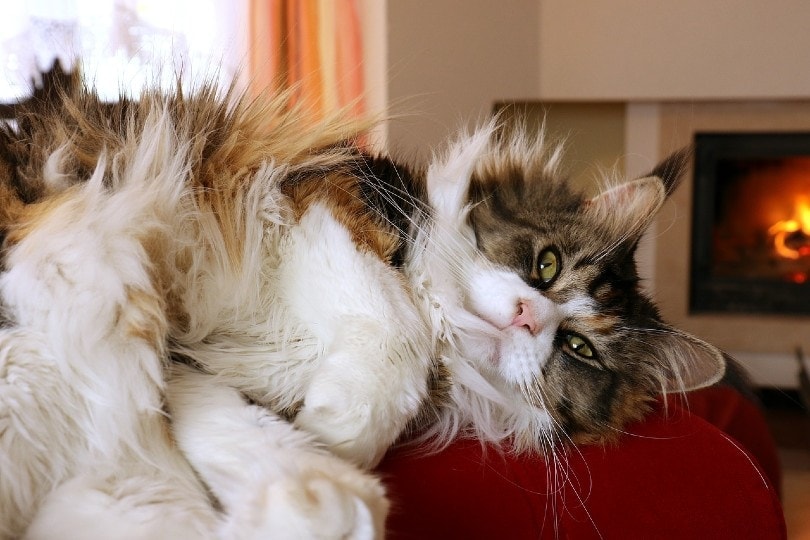
Regular Brushing
There’s no getting around the fact that your Maine Coon cat is going to need regular brushing. Not only does brushing help remove dead hair before it ends up all over your clothes or furniture, but it also helps prevent matting and tangling, while keeping the coat in good condition.
Daily brushing is ideal, especially during higher shedding times, but try to brush weekly at a minimum. A wire slicker brush or rubber brush are two good options for grooming your Maine Coon.
The earlier you can get your Maine Coon kitten used to brushing the easier the experience will be for you and your cat. Introduce your kitten to brushing gently and always make sure it’s a positive experience. Offering treats during and after a grooming session is a great way to help your Maine Coon cat learn to tolerate and even enjoy brushing.
Bathing
This may seem like an odd suggestion because it’s generally believed that cats hate water and won’t tolerate bathing. Well, that’s not always the case, especially for Maine Coons. Many cats accept bathing, even if they’re never going to be huge fans of the process. Maine Coons are also known to be more water-tolerant than some other cat breeds. Bathing can remove a lot of dead hair before it has a chance to shed into your house.
As with the brushing, it’s going to be easier to bathe your Maine Coon if you get them used to the process when they’re kittens. Start slowly and don’t force your kitten into the bath if they seem to dislike it initially. Be patient and allow them to play with and get familiar with water first and then see if they will tolerate a bath.
Always use a shampoo made for cats because human shampoos can cause dry skin and hair in cats.
If your Maine Coon dislikes bathing, another option is to use cat wipes or a waterless shampoo to keep your cat clean and remove some of that dead hair.
Diet
Feeding your Maine Coon a high-quality, nutritious diet will help keep their coat in the best condition and reduce shedding. Make sure that whatever food you feed your cat is high in omega-3 and omega-6 fatty acids, which are key to skin and coat health. You can also ask your veterinarian whether a fatty acid supplement might be beneficial to your Maine Coon cat.
Keep Them Bug-Free
Fleas, ticks, and other parasites will not only make your Maine Coon’s life miserable but affect their coat condition as well. Constant scratching of flea bites can kick a lot of hair loose and lead to sore and infected skin as well. Ask your veterinarian about your options for effective flea and tick control.
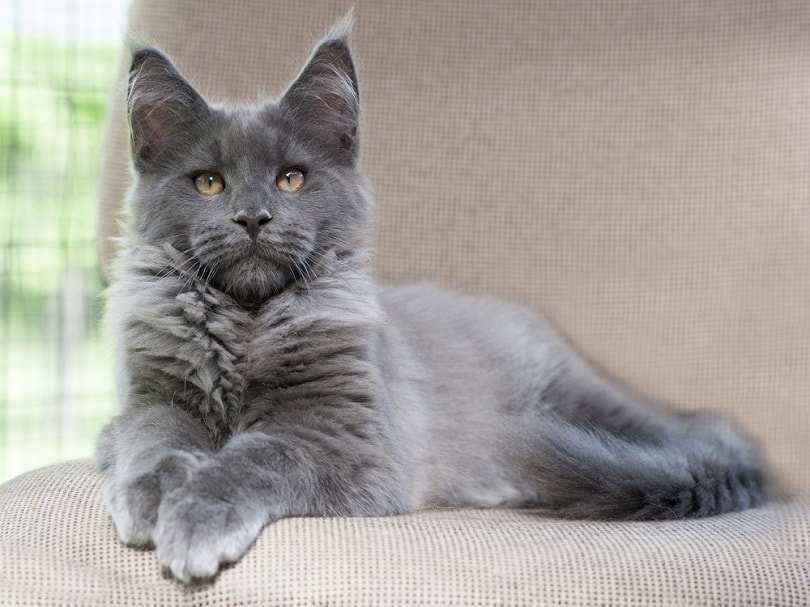
Buy Lint Rollers
Even if you follow every suggestion on this list, at the end of the day, you’re still going to have to learn to live with your Maine Coon shedding at least some hair. Sweep and vacuum as needed and invest in some quality lint rollers to help keep your clothes hair-free!
How Much Is Too Much? When Hair Loss Becomes a Concern
Shedding is a natural part of a Maine Coon cat’s life, but what if your cat seems to be losing an excessive amount of hair? Or maybe you don’t notice that you’re cleaning up more hair but you do see bald patches appearing in your Maine Coon’s usually thick coat.
Some health conditions can cause hair loss, so if you do start noticing signs like these, don’t assume it’s just an unusually heavy shedding cycle.
Hair loss can be a sign of these or other, more serious diseases. If you are concerned about your cat’s hair loss, be sure to consult your veterinarian as soon as possible.
Conclusion
Shedding and pet hair are just a fact of life for most pet lovers. Sure, we may not love having to lint roll our clothes every time we leave the house, but it’s usually a small price to pay for the joy we get from sharing our lives with pets. Maine Coon cat owners are no exception. Yes, Maine Coon cats are going to shed, but as we have seen, there are ways to manage that shedding. And judging by how popular Maine Coon cats are, shedding is no obstacle for many owners in bringing one of these gorgeous kitties into their families.
Featured Image Credit: Olga Korvinuss, Shutterstock

